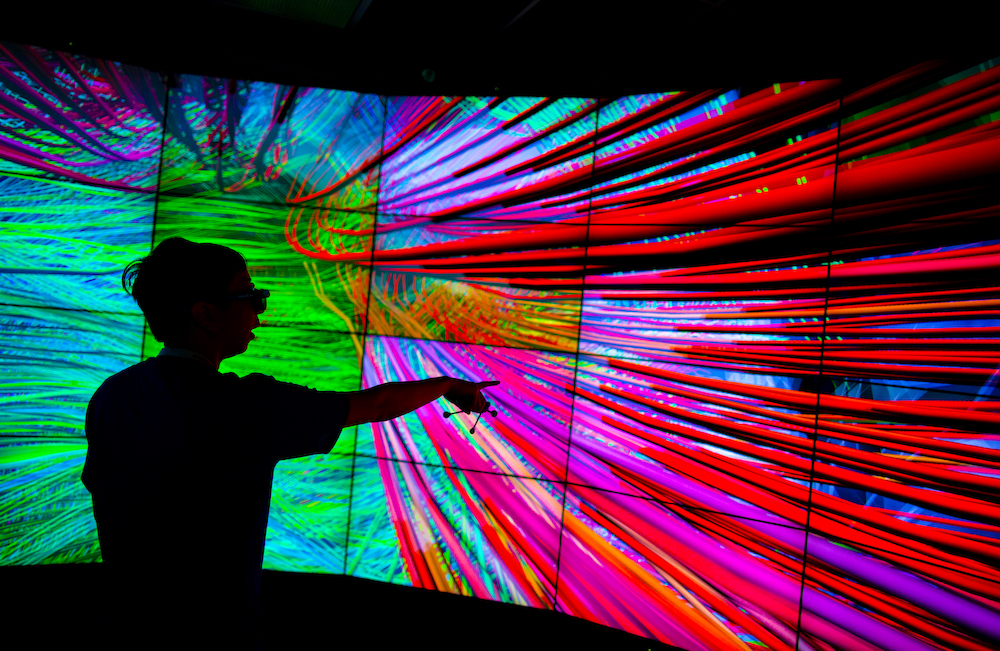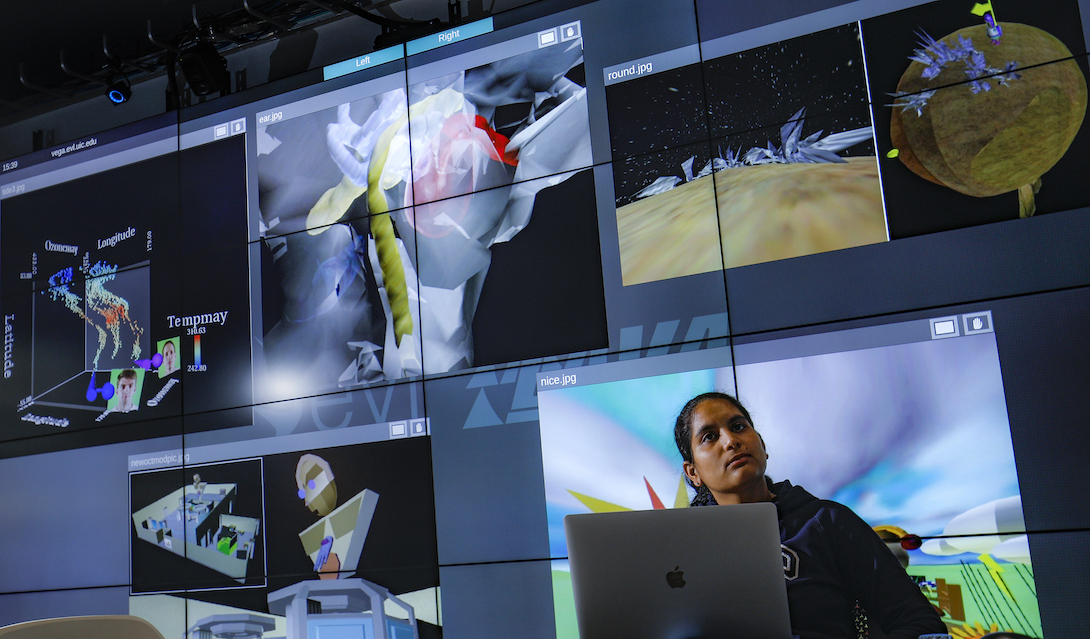Computer Science + Design Major
Introduction Heading link

Technology and creativity represent one of the most powerful combinations in the current job market.
UIC is the only public university in the United States that offers a computer science + design undergraduate degree created specifically to prepare students for these opportunities.
This program offers professional training in both fields, integrating design courses — fundamental through advanced — with a strong foundation in computer programming. Students who complete this degree will join a new generation of technically savvy designers and creative scientists who operate in the wildly exciting space between these two worlds.
If the following sound interesting, you could be an ideal candidate for UIC’s computer science + design program:
- Augmented and virtual reality design
- Computer graphics
- Creative coding
- Data visualization
- Designing and developing digital interfaces and applications
- Human-centered computing
- Media design
- Mobile platforms and apps
- Virtual health and medicine
- 3D fabrication
- 3D typography

Get to know the CS + Design major Heading link
In just one page, get a sense of what CS majors study at UIC and go on to do after graduation.
Curriculum Heading link
The core design curriculum is comprised of four studio courses that provide students with an effective range of technical and critical skills and the opportunity to apply them through a year-long collaborative professional practice course.
The core computer science curriculum consists of required technical courses followed by a range of computer science selective courses offering specializations in systems, software, languages, algorithms, and computer design.
In all courses within the major, students have the chance to work in teams and to practice being a bridge between the technological and the creative.
Click each of the tabs below to learn about the 122 credits required for this major.
Required general education and non-core courses: 46 credits
Required general education and non-core courses: 46 credits
- ENG 160 Academic Writing I: Writing in Academic and Public Contexts (3 credits)
- ENG 161 Academic Writing II: Writing for Inquiry and Research (3 credits)
- AH 110 Art History I (4 credits) fulfills Understanding the Creative Arts requirement
DES 236 History of Design II (3 credits) fulfills Humanities, Social Sciences and Arts requirement - DES 355 Design Seminar (3 credits) fulfills Humanities, Social Sciences and Arts requirement
- One course in Exploring World Cultures (3 credits)
- One course in Understanding the Individual in Society (3 credits)
- One course in Understanding the Past (3 credits)
- One course in Understanding U.S. Society (3 credits)
- MATH 180 Calculus I (4 credits) fulfills Math and Science requirement
- MATH 181 Calculus II (4 credits) fulfills Math, Statistics, and Industrial Engineering requirement
- IE 342 Probability and Statistics (3 credits)
- Science elective (4 credits)
- MATH / SE science elective (3 credits)
Computer science core requirements (36 credits)
Computer science core requirements (36 credits)
- CS 111 Program Design I (3 credits)
- CS 141 Program Design II (3 credits)
- CS 151 Math Foundations of CS (3 credits)
- ENGR 100 Engineering Orientation (0 credits)
- CS 211 Programming Practicum (2 credits)
- CS 251 Data Structures (4 credits)
- CS 261 Machine Organization (3 credits)
- CS 427 / DES 427 Creative Coding (3 credits)
Plus two of these courses:
- CS 301 Languages and Automata (3 credits)
- CS 341 Programming Language Design (3 credits)
- CS 342 Software Design (3 credits)
- CS 361 Systems Programming (3 credits)
- CS 362 Computer Design (3 credits)
- CS 401 Algorithms (3 credits)
Plus computer science technical electives totaling 6 credits
Design core requirements (40 credits)
Design core requirements (40 credits)
- DES 150 Digital Media Design I (4 credits)
- DES 160 Design Photography (4 credits) or DES 170 Color Theory (4 credits)
- DES 208 Type I: Form (4 credits)
- DES 209 Type II: Systems (4 credits)
- DES 255 Integrative Design Studio I (4 credits)
- DES 256 Integrative Design Studio II (4 credits)
- DES 357 Integrative Design Studio III (4 credits)
- DES 358 Integrative Design Project (4 credits)
Students then choose one year-long professional practice track option:
- DES 420 Professional Practice Project I (4 credits) and DES 421 Professional Practice Project II (4 credits)
- DES 430 Interdisciplinary Product Development I (4 credits) and DES 431 Interdisciplinary Product Development II (4 credits)
- DES 452 Information Aesthetics I (4 credits) and DES 453 Information Aesthetics II (4 credits)
Student learning objectives: CS + design major Heading link

Successful graduates of UIC’s computer science + design program emerge with the balanced set of skills they need to move on to industry jobs or graduate study. They will have the computer science and design skills to serve as master collaborators in workplace teams that include colleagues from both fields.
Upon completing the BS in Computer Science + Design, graduates will be able to:
- Demonstrate an understanding of the possibilities and contexts of design practice.
- Relate specific trends in contemporary design to historical development of the field.
- Formulate concepts in response to design criteria.
- Identify, formulate, and solve complex design and computational problems.
- Conduct visual and textual research.
- Demonstrate how human factors impact design.
- Demonstrate an understanding of informational and visual hierarchy.
- Transform data into meaningful insights for design and computer science applications.
- Visualize design concepts in 2D, 3D, Interactive and data-driven models.
- Utilize both digital and physical prototyping tools for creative, computational and analytic discovery.
- Analyze a problem and identify and define the computing requirements appropriate to its solution.
- Apply design and development principles, mathematical foundations, algorithmic principles, and computer science theory in the design, modeling, and construction of software and computer-based systems of moderate complexity.
- Engage in continuing professional development.
- Articulate and document design and development process.
- Participate in and respond to critical analysis of research findings and creative work.
- Design and conduct experiments, analyze and interpret data.
- Design a system, component, or process to meet desired needs within realistic constraints such as economic, environmental, social, political, ethical, health and safety, manufacturability, and sustainability.
- Understand professional and ethical responsibility.
- Communicate and function effectively in interdisciplinary collaborations and teams.
- Understand the impact of design and engineering solutions in a global, economic, environmental, and societal context.
- Use the techniques, skills, and tools necessary for computing practice.
- Apply advanced mathematics (including differential equations and statistics), science, and engineering to solve problems at the interface of computer science and design.